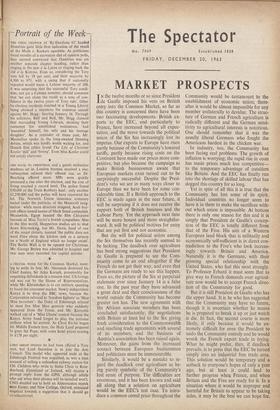MARKET PROSPECTS
IN the twelve months or so since President de Gaulle imposed his veto, on British entry into the Common Market, so far as this country is concerned there have been two fascinating developments. 13ritish ex- ports to the EEC, and particularly to France, have increased beyond all expec- tation, and the move towards the political union of the Six has increasingly lost its impetus. Our exports to Europe have risen partly because of the Community's lowered tariffs, partly because rising costs on the Continent have made our prices more com- petitive, but also because the campaign to make British businessmen aware that European markets exist turned out to be surprisingly successful. Despite the Presi- dent's veto we are in many ways closer to Europe than we have been for some con- siderable time. If a British approach to the EEC is made again in the near future, it will be surprising if it does not receive the support both of British business and the Labour Party. Yet the approach next time will be more honest and more straightfor- ward. It, will be political motives for entry that are put first and not economic.
But the will for political union among the Six themselves has recently seemed to be lacking. The deadlock over agriculture has bred strong suggestions that President de Gaulle is prepared to see the Com- munity come to an end altogether if the French do not get their way, and even that the Germans are ready to see this happen. Even so, the picture of the Six at perpetual stalemate ever since January 14 is a false one. In the past year they have advanced a great deal and their consciousness of the world outside the Community has become greater not less. The new agreement with the African associate members has been concluded satisfactorily; the negotiations with Britain at least led to the Six giving fresh consideration to the Commonwealth and reaching trade agreements with several of its members, and the business of Austria's association has been raised again. Moreover, the gains from the increased contact between European businessmen and politicians must be immeasurable.
Similarly, it would be a mistake to re- gard the deadlock over agriculture as be- ing purely symbolic of the Community's lost sense of purpose. The difficulties are enormous, and it has been known and said all along that a solution on agriculture would be the EEC's test case. To intro- duce a common cereal price throughout the Community would be tantamount to the establishment of economic union; there- after it would be almost impossible for any member unilaterally to devalue. The struc ture of German and French agriculture is radically different and the German sensi tivity to agricultural interests is notorious One should remember that it was the usually liberal Germans who fought the Americans hardest in the chicken war.
In industry, too, the Community has been facing real problems. The growth of inflation is worrying; the rapid rise in costs has made prices much less competitive— to the temporary advantage of outsiders like Britain. And the EEC has finally run into the shortage of skilled labour that has dogged this country for so long.
Yet in spite of all this it is true that the Community has lost some of its spirit. Individual countries no longer seem to have it in them to make the sacrifices with- out which union is impossible. At bottom there is only one reason for this and it is simply that President de Gaulle's concep- tion of the EEC is totally different from that of the Five. His aim of a Western European land block that is militarily and economically self-sufficient is in direct con- tradiction to the Five's who look increas- ingly towards Britain and America. Naturally it is the Germans, with their growing special relationship with the United States, who feel this most strongly. To Professor Erhard it must seem that to give way to French demands over agricul- ture now would be to accept French direc- tion of the Community for good.
But it is still President de Gaulle who has the upper hand. It is he who has suggested that the Community may have no future, though it is uncertain whether he means he is prepared to break it up or just watch it die. In fact, the second course is more likely, if only because it would be ex- tremely difficult for even the President to undo the Community entirely and he would wreck the French export trade in trying. What he might prefer, then, if deadlock prevails, is to press that the EEC be turned simply into an industrial free trade area. This solution would be temporary and a setback to everyone's hopes of only a year ago, but at least it could lead to further progress when France, and when Britain and the Five are ready for it. In a situation where it would be improper and harmful for Britain to appear to be taking sides, it may be the best we can hope for.






























 Previous page
Previous page